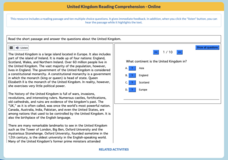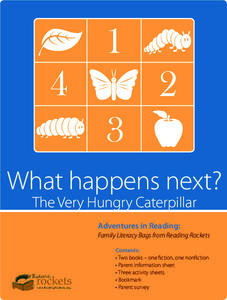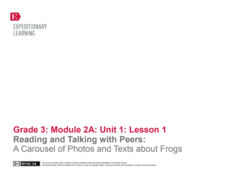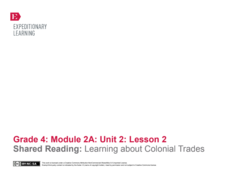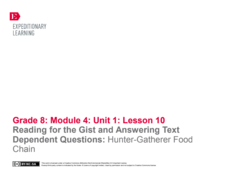Curated OER
Swing Your Partner!
This was written for ESOL learners, but could work for any elementary class. Learners read about the American dance style known as Square Dancing. They explore its use in literature, write a friendly letter about it, and then use their...
Curated OER
The Lightning Thief: During Reading Strategy
After reading up to page 371 of Percy Jackson and The Olympians: The Lightning Thief by Rick Riordan, get insight into how Percy felt making a major decision through active discussion strategies that enable both academic...
Curated OER
Phineas Gage: “This I Believe” Venn Diagrams After Reading Strategy
Difficulties with brain injuries still continue today. After reading Phineas Gage: A Gruesome but True Story About Brain Science, class members read a series of modern personal essays about brain injuries and choose an essay to compare...
Read Works
Trading Pumpkins
Can you imagine a pumpkin patch without pumpkins? Learners read how Tammy's family solves their problem in a cooperative way, followed by a set of 10 reading comprehension questions.
Reading Worksheets
Inferences Worksheet 9
Help your pupils take charge of their inferring abilities with an exercise designed for direct practice with making and supporting inferences. Learners read four short passages and answer two to three questions for each passage that...
Academy of American Poets
Teach This Poem: “Crisscross” by Arthur Sze
Arthur Sze's poem "Crisscross" launches a instructional activity that asks scholars to use their observation skills. They first draw an image that reflects what crisscross means to them. They then examine a photograph of a lightning...
Mr. Nussbaum
United Kingdom
An interactive practice tests scholars' reading comprehension skills. Learners read an informative text, then answer 10 questions.
Florida Center for Reading Research
Phonics: Varient Correspondances, Silent "e" Changes
Engage early readers in a silent e activity to help them understand the changes the letter can make to a simple word. With the provided cards, learners read and write each word as it appears without the silent e. Then they read and write...
K5 Learning
Sun, Stars and Moon
Learners read about the objects we see in our night and day skies before answering five short answer comprehension questions.
K5 Learning
The Swift Runner
How did the deer get its antlers? Learners read through a short story about an animal race and the winner's prize before answering comprehension questions.
University of California
Student Workbook: Reading Comprehension
Teach your class five reading strategies to help them with reading informational texts and literary texts. This packet, designed to help learners prepare for the CAHSEE, provides specific strategies that could be used to help prepare for...
EngageNY
Asking and Answering Questions: Reading about a Frog's Habitat
Building upon previous lessons, scholars take to asking and answering questions about a frog's habitat. A partner discussion follows a read-aloud of an informational text in preparation for a worksheet that boosts reading comprehension...
Benjamin Franklin Tercentenary
What Ben Read
Just what did Ben Franklin read? By juxtaposing Ben Franklin’s reading material as a young man with an analysis of his developed ideas, learners gain the opportunity to see how the influences of his youthful reading played out. Roman,...
PBS
Reading Adventure Pack: What's Next? The Very Hungry Caterpillar
A series of hands-on activities follows a reading of The Very Hungry Caterpillar by Eric Carle. Learners create a paper collage to explore the beginning, middle, and end of days of the week, numbers, and more. They grow a butterfly...
EngageNY
Reading and Talking with Peers: A Carousel of Photos and Texts about Frogs
Frogs are the theme of a lesson plan that challenges scholars to examine photographs, read informational texts, then ask and answer questions. Scholars work collaboratelively as they rotate through stations, discuss their observations,...
EngageNY
Reading for Gist, Answering Text-Dependent Questions, and Determining Author’s Purpose: Industrial Food Chain
A Reading Closely: Guiding Questions handout leads readers to discover the gist of The Omnivore’s Dilemma. While reading, pupils look closely at the words in the text and discuss their meaning. They use dictionaries when needed to answer...
K12 Reader
Drop the Mop!
Combine a study of -op words with a bit of reading comprehension. Learners read a quick a silly poem containing many -op words and then answer three questions.
EngageNY
Reading for Gist, Answering Text-Dependent Questions, and Determining Author’s Purpose: Industrial Organic Food Chain
After re-reading The Omnivore’s Dilemma using a Reading Closely: Guiding Questions handout, class members use sticky notes to annotate and determine the gist of the text. Finally, they use an Author’s Purpose graphic organizer to...
EngageNY
Close Reading: Excerpt 2 of “The Digital Revolution and the Adolescent Brain Evolution”
Help scholars comprehend a challenging text. Using the resource, pupils read excerpts from an article about the digital revolution and adolescent brain development. As they read, they answer text-dependent questions and complete a close...
Teacher's Corner
Compare and Contrast Dr. Seuss
Celebrate Read Across America Day and Dr. Seuss' birthday with this compare and contrast graphic organizer in which three stories are examined for their setting, characters, problems, events, and solution.
EngageNY
Shared Reading: Learning About Colonial Trades
Trading in Colonial America is the focus of a lesson plan that boosts reading skills. As a class, scholars examine the informational text for crucial details, use their newfound knowledge to share information with their peers, and write...
EngageNY
Reading for the Gist and Answering Text Dependent Questions: Hunter-Gatherer Food Chain
Readers use sticky notes and a close reading guide to identify the gist of "My Pig" on pages 240–245 of The Omnivore's Dilemma. After reviewing their thoughts with peers, they answer text-dependent questions about the section.
EngageNY
Close Reading: Excerpt 5 of “The Digital Revolution and the Adolescent Brain Evolution”
Class members consider how technology affects social interactions as they continue reading an article about the digital revolution and adolescent brain development. Then, working in pairs, scholars answer text-dependent questions and...
EngageNY
Independent Reading: Final Product
Cheater! Scholars create independent reading cheat sheets to help others learn about a book. They rate the book, list quotes, and describe how they connected to the text. Readers share their cheat sheets with others and conduct a gallery...






